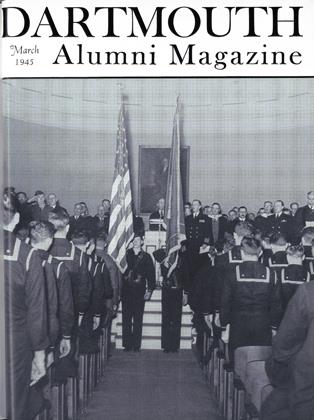WHATEVER ELSE POST-WAR planning may be it should at least be realistictinged inevitably with idealism, but having the roots embedded in good, honest soil. Therein lies the chief difficulty, for we are all prone to exalt either element to the diminution of the other according to the temperament of the planner. It is so easy to plan in terms of men-as-they-ought-to-be, rather than in terms of men-as-they-are. Especially it may be well to guard against the idea that the gruelling stress of war is sure to work some fundamental change in basic human nature, because all human experience indicates that this doesn't happen. Changes there will doubtless be, both in individual and mass thinking. Such a terrific experience is sure to leave its mark. Nevertheless it may be well not to expect too much of humanity as a whole. Our race has undergone very similar strains and stresses in times past, and fundamentally has remained pretty much as it was before.
Peace is the normal condition of the civilized world, and if it be true that "walking is merely a series of interrupted falls" much the same thing can be said of human progress. It remains necessary to go forward, with the same feet, the same capacity for sustained balance, on the same old solid ground. When nation ceases to war against nation and the world reverts to its more normal condition, human requirements for the art of living productively and happily in association with others will not be greatly different from what they were before, save that hopefully the world will be a more tolerant place, purified as by fire from its poisons of internationalistic hate, jealousy and distrust. What seemed desirable before will be desirable still, but hopefully with a better prospect of being attained and established. Men will still be men, actuated by the same general feelings as before. The same old wants will exist and will clamor for satisfaction. What we may hope for is a better realization of the ways in which such satisfaction may be obtained, and a clearer knowledge of whatsoever things are right.
The function of the colleges, as this writer sees it, will be what they have always been; to wit, to inculcate in young men an aspiration toward such things as are true and of good report. The question is of the best means of fulfilling that function. Undoubtedly there will be a modification of old ideas concerning those means and to that subject the best minds among educators everywhere will be bent. As always one must strive, in Kipling's famous phrase, to paint the thing as he sees it, for the God of Things as They Are. From what we have gone through there may come a clearer light. It may be plainer than before what the eternal verities are, within the framework of our terrestrial life, in harmony with which men must live. But life on earth will still be life on earth, and men will still be men, sore let and hindered by human frailty. It would seem to be wise to allow our idealism to be tempered by realism, to the end that what we have thought and felt and dreamed of good shall exist—not its substance, but itself.
The colleges will still have their honor and their toil—indeed the importance of liberal education, so far from being diminished, will be enormously enhanced. As of old, much good seed will fall on stony ground; but the chances favor the curtailment of non-productive acreage and the vast increase of more fertile intellectual soil.
 View Full Issue
View Full Issue
More From This Issue
-
 Article
ArticleSCHOOL FOR CRAFTSMEN
March 1945 By C. E. W. -
 Class Notes
Class Notes1929
March 1945 By F. WILLIAM ANDRES, T. TRUXTON BRITTAN JR. -
 Article
ArticleLaureled Sons of Dartmouth
March 1945 -
 Class Notes
Class Notes1918
March 1945 By ERNEST H. EARLEY, DONALD L. BARR -
 Article
Article'Round the Girdled Earth
March 1945 By H. F. W. -
 Class Notes
Class Notes1919
March 1945 By J. KENNETH HUNTINGTON, MAX A. NORTON
P. S. M.
-
 Article
ArticleJust What Is "Practical"
April 1943 By P. S. M. -
 Article
ArticleWe Shall Because We Must
May 1943 By P. S. M. -
 Article
ArticleGradus ad Quod?
February 1944 By P. S. M. -
 Article
ArticleWhat Are the Liberal Arts?
November 1944 By P. S. M. -
 Article
ArticleWorld Organization
May 1945 By P. S. M. -
 Article
ArticleFestina Lente
August 1946 By P. S. M.
Article
-
 Article
ArticleFIRST TRICOLLEGIATE LEAGUE DEBATE
APRIL 1906 -
 Article
ArticleTop Club Secretary
November 1961 -
 Article
ArticleCircling the Green
April 1981 -
 Article
ArticleCollege Chosen for Debate
November 1983 -
 Article
ArticleExploring a Fourth-Dimensional World
MARCH 1973 By JOSHUA D. WARACH '76 -
 Article
ArticleMilitary Training
November 1944 By P. S. M.

